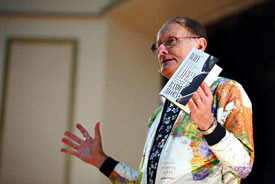Randy Alcorn's Blog, page 209
August 24, 2012
Will there be books and reading on the New Earth?
My friend said, “I don’t see why there shouldn’t be books in Heaven. But you will find that your library in Heaven contains only some of the books you had on earth.” “Which?” I asked. “The ones you gave away or lent.” “I hope the lent ones won’t still have all the borrowers’ dirty thumb marks,” said I. “Oh yes they will,” said he. “But just as the wounds of the martyrs will have turned into beauties, so you will find that the thumb-marks have turned into beautiful illuminated capitals or exquisite marginal woodcuts.” –C.S. Lewis, God in the Dock
We know that sixty-six books, those that comprise the Bible, will be in Heaven—”Your Word, O Lord, is eternal; it stands firm in the heavens” (Psalm 119:89). Jesus said, “Heaven and earth will pass away, but my words will never pass away” (Matthew 24:35). Presumably, we will read, study, contemplate, and discuss God’s Word.
 There are also other books in Heaven: “I saw the dead, great and small, standing before the throne, and books were opened. Another book was opened, which is the book of life. The dead were judged according to what they had done as recorded in the books” (Revelation 20:12).
There are also other books in Heaven: “I saw the dead, great and small, standing before the throne, and books were opened. Another book was opened, which is the book of life. The dead were judged according to what they had done as recorded in the books” (Revelation 20:12).
Malachi 3:16-18 is a remarkable passage that tells us God documents the faithful deeds of his children on Earth: “Then those who feared the Lord talked with each other, and the Lord listened and heard. A scroll of remembrance was written in his presence concerning those who feared the Lord and honored his name. ‘They will be mine,’ says the Lord Almighty, ‘in the day when I make up my treasured possession. I will spare them, just as in compassion a man spares his son who serves him. And you will again see the distinction between the righteous and the wicked, between those who serve God and those who do not.’ “
I believe that on the New Earth, we’ll also read books, new and old, written by people. We’ll have strong intellects, great curiosity, and unlimited time. It’s likely that books will have a greater role in our lives in Heaven than they do now. The libraries of the New Earth, I imagine, will be fantastic.
We’ll have no lack of resources to study and understand. I once helped a young friend search for her biological mother, going through old court records, looking for just the right clue. We finally found it. I had the privilege of introducing them to each other. It was a taste of Heaven—where not all reunions will happen all at once, I imagine, but as eternity unfolds.
Every biblical genealogy is a testimony to God’s interest in history, heritage, and the unfolding of events on Earth. Will God lose interest in Earth? Will we? No. The New Earth’s history includes that of the old Earth. But a new history will be built and recorded, a new civilization, wondrous beyond imagination. And we who know the King will all be part of it.
 Books are part of culture. I expect many new books, great books, will be written on the New Earth. But I also believe that some books will endure from the old Earth. Any book that contains falsehood and dishonors God will have no place in Heaven. But what about great books, nonfiction and fiction? Will we find A. W. Tozer’s The Knowledge of the Holy, J. I. Packer’s Knowing God, John Piper’s Desiring God, John Bunyan’s Pilgrim's Progress, and Charles Sheldon’s In His Steps on the New Earth? I’ll be amazed if we don’t find them there, just as I’ll be amazed if no one sings John Newton’s “Amazing Grace” in Heaven.
Books are part of culture. I expect many new books, great books, will be written on the New Earth. But I also believe that some books will endure from the old Earth. Any book that contains falsehood and dishonors God will have no place in Heaven. But what about great books, nonfiction and fiction? Will we find A. W. Tozer’s The Knowledge of the Holy, J. I. Packer’s Knowing God, John Piper’s Desiring God, John Bunyan’s Pilgrim's Progress, and Charles Sheldon’s In His Steps on the New Earth? I’ll be amazed if we don’t find them there, just as I’ll be amazed if no one sings John Newton’s “Amazing Grace” in Heaven.
Perhaps those of us who are writers will go back to some of our published works and rewrite them in light of the perspective we’ll gain. Maybe we’ll look at our other books and realize they’re no longer important—and some of them never were. The New Earth, I think, will confirm many things I’ve written in this book. It will completely dismantle others. “What was I thinking?” I’ll ask myself. (If I knew which parts those were right now, I’d cut them out!) And I’ll marvel at how much better the New Earth is than I ever imagined.
Consider comedy that makes you laugh but not at the expense of another. Reflect upon poetry that brings tears to your eyes, paintings that put you in raptures, music that gives you goose bumps, . . . Do our aesthetic adventures depend upon sin for flavor? I think not.
–Arthur Roberts, Exploring Heaven

August 22, 2012
Calvin Miller, author and Christ-lover, with the Lord
 Five days ago a friend and author, poet, artist, speaker and professor Calvin Miller exited this world and entered a better one. The first time I met Calvin, I told him how his classic Singer trilogy had shaped and influenced me and charged my imagination as a teenager, a brand new Christian in the 70’s. (I’m sure he’d heard that hundreds of times, but seemed as thrilled by it as he’d probably been every other time.)
Five days ago a friend and author, poet, artist, speaker and professor Calvin Miller exited this world and entered a better one. The first time I met Calvin, I told him how his classic Singer trilogy had shaped and influenced me and charged my imagination as a teenager, a brand new Christian in the 70’s. (I’m sure he’d heard that hundreds of times, but seemed as thrilled by it as he’d probably been every other time.)
When I saw him periodically over the decades, and talked on the phone, we spoke of Jesus, his grace and Heaven. I love this man. What a joy to be with.
Years ago at Mount Hermon conference center, Calvin and I shared the keynote sessions at their annual writer’s conference, where I read from some of his writings to those attending , including a favorite poem I’ll cite below, which is included in Heaven and two of my other books. I saw Calvin at various places over the years, and always there was heartfelt warmth, picking up right where we left off. He was a very genuine brother, with a deep love for Jesus (and all the more so now). What higher compliment can I pay?
 Five years ago when he asked me to endorse one of his books, I wrote something that didn’t just characterize that book but his life: “Calvin Miller baptized my imagination when, as a young Christian, I read his Singer trilogy. Once Upon a Tree is poetic craftsmanship infused with grace. Miller opens the window. Breathe deeply. He shines the light on Jesus. Open wide your eyes.” (Calvin’s website has a great video of him, a trailer for his latest book Letters to Heaven, which I enjoyed watching.)
Five years ago when he asked me to endorse one of his books, I wrote something that didn’t just characterize that book but his life: “Calvin Miller baptized my imagination when, as a young Christian, I read his Singer trilogy. Once Upon a Tree is poetic craftsmanship infused with grace. Miller opens the window. Breathe deeply. He shines the light on Jesus. Open wide your eyes.” (Calvin’s website has a great video of him, a trailer for his latest book Letters to Heaven, which I enjoyed watching.)
In the final book of the Singer Trilogy, The Finale, Calvin wrote: “The world is poor because her fortune is buried in the sky and all her treasure maps are of earth.”
I’ll conclude with his poem I quote in Heaven and which I’ve read at several memorial services, and would love to have read at mine:
I once scorned ev’ry fearful thought of death,
When it was but the end of pulse and breath,
But now my eyes have seen that past the pain
There is a world that’s waiting to be claimed.
Earthmaker, Holy, let me now depart,
For living’s such a temporary art.
And dying is but getting dressed for God,
Our graves are merely doorways cut in sod.
Calvin Miller, The Divine Symphony (Minneapolis: Bethany, 2000), 139.
Over the years, whenever I’ve thought of Calvin, I always smile. I can’t wait to see him again when, by God’s grace, I make it through that doorway. I look forward to taking long walks with him and others together on the New Earth, laughing and rejoicing, and seeing unfiltered the love of Jesus on Calvin’s face and a myriad of others. And of asking Jesus to walk with us, knowing and celebrating the fact that all we are and have and will ever enjoy, we owe to Him.

August 20, 2012
George Verwer: Prolife Hero
 I have the greatest appreciation for George Verwer, founder of Operation Mobilization (OM) and an advocate for worldwide missions. We have long supported George and OM in funding special missions projects all over the world, and providing books to sell and give away on their ships.
I have the greatest appreciation for George Verwer, founder of Operation Mobilization (OM) and an advocate for worldwide missions. We have long supported George and OM in funding special missions projects all over the world, and providing books to sell and give away on their ships.
Some years ago George contacted me, saying God had laid on his heart the plight of unborn children. I was grateful to hear this, but wasn’t sure whether this vision would last given the fact that many people, Christians included, object to hearing about it. Well, George is a man who listens to God rather than voices that don’t tolerate speakers who address abortion. He has given away thousands of copies of my book, Why Pro-Life?, in English and spearheaded its translations into other languages all over the world. EPM has donated to Operation Mobilization over 89,000 copies of the book.
Last year George wrote to his supporters, “My heart breaks for the unborn... I have in my hands just in from India samples of Why Pro-Life? in 4 more major Indian languages...huge quantities have gone out on the ship as 100,000 visitors came to the ship In Cochin in a couple weeks.”
I’m grateful for George’s partnership in sharing the truth about the unborn worldwide, and also for his example in serving Christ wholeheartedly. (A fun fact about his worldwide travels: OM reports that this year United Airlines awarded him for flying a million miles.)
George was recently presented with the “pro-life hero” award by SPUC (Society for the Protection of Unborn Children) in London. I love what John Smeaton, director of SPUC, wrote, especially because it exemplifies that concern for the unborn is not some isolated issue, but is intertwined with helping all needy people groups:
George continues to travel around the world preaching about Christ and about seven people lying at the side of the road which include: children at risk, abused women, the extreme poor, the HIV/Aids patient, people with impure water, the unborn, and the environment.
Here’s what George said about the unborn in his recent article about “the people lying on the side of the road”:
Some estimates put the number of children who have been aborted at 500 million. The numbers are staggering, and in many ways I would rather ignore them. But I know that I cannot. I confess, when my close friend Dr. Francis Schaeffer decided to put so much effort into the pro-life movement towards the end of his life, I thought he had gone a little extreme. I no longer feel this way, and repent of my own inaction. In some countries there are more abortions than births, and the laws in some nations allow abortion until the day before birth. How can this be?
With so much abortion taking place, let us not consider it a lost cause and give up. No, many battles have been won, and every battle is a victory; every saved life a real person. I believe that there are thousands alive today who otherwise would not have been without pro-life action. Are not these saved lives worth the effort? Yes, they are!
So let us be people of vision, action and especially grace—grace for the mothers, for those in the pro-choice camp, and for fellow Christians who disagree. Recommended reading: Why Pro Life? by Randy Alcorn.
This isn’t about my book, though I’m delighted George circulates it. Rather, this is an example of a man whose life is focused on one central kingdom cause—world missions—but who has been touched by God to now frequently speak in defense of unborn children. In the context of missions, the unborn are seldom spoken of, and prolife efforts are sometimes considered a distraction from the main thing. (See an article I wrote whether prolife issues are a distraction from the Great Commission, or part of it.)
 I know George well, and he has become unpopular in some circles for including the unborn on his otherwise fully acceptable list of people in need. And to speak about the unborn at missions conferences? It's utterly unheard of. (I believe missions should be spoken of at more prolife conferences too.) But George, arguably the greatest missions proponent on the planet, who has spoken at hundreds of missions conferences all over the world, sees no dichotomy between them. All those in need are worth our attention. Not only the unborn, but not excluding the unborn either.
I know George well, and he has become unpopular in some circles for including the unborn on his otherwise fully acceptable list of people in need. And to speak about the unborn at missions conferences? It's utterly unheard of. (I believe missions should be spoken of at more prolife conferences too.) But George, arguably the greatest missions proponent on the planet, who has spoken at hundreds of missions conferences all over the world, sees no dichotomy between them. All those in need are worth our attention. Not only the unborn, but not excluding the unborn either.
I join my friend George Verwer in appealing to people to, on the one hand, not consider unborn children the only just cause, but to INCLUDE the unborn on that short list of critical "love your neighbor" issues crying out for our attention. It’s not either/or, it’s both/and. Let’s make room in our hearts for both already-born people and pre-born people. God is their Creator, and He calls upon us to “speak up for those who cannot speak for themselves; defend the rights of the poor and needy” (Proverbs 31:8-9).

August 17, 2012
"Are homosexual sins worse than other sins?"
Recently when I posted an article from Tony Reinke about homosexuality and idolatry on my blog, I received a thoughtful question from a reader asking if homosexuality is a “worse” sin than others in God’s view. Here’s my answer.
The point isn’t that homosexual sin is worse than other sins, but that it’s a result of and related to idolatry.
Romans 1:22-27 says:
22 Claiming to be wise, they became fools, 23 and exchanged the glory of the immortal God for images resembling mortal man and birds and animals and creeping things.
24 Therefore God gave them up in the lusts of their hearts to impurity, to the dishonoring of their bodies among themselves, 25 because they exchanged the truth about God for a lie and worshiped and served the creature rather than the Creator, who is blessed forever! Amen.
26 For this reason God gave them up to dishonorable passions. For their women exchanged natural relations for those that are contrary to nature; 27 and the men likewise gave up natural relations with women and were consumed with passion for one another, men committing shameless acts with men and receiving in themselves the due penalty for their error.
Ezekiel 16:48-50 is a passage that is widely used now to defend the position that God doesn’t hate homosexuality. Those who cite it to defend this position say that Sodom was destroyed not because of homosexual sin, but rather because they were proud and didn’t care for the poor.
As I live, declares the Lord God, your sister Sodom and her daughters have not done as you and your daughters have done. Behold, this was the guilt of your sister Sodom: she and her daughters had pride, excess of food, and prosperous ease, but did not aid the poor and needy. They were haughty and did an abomination before me. So I removed them, when I saw it. (Ezekiel 16:48-50)
Ezekiel is not saying God didn’t hate the homosexual lust in the Genesis account (see Jude 7 below), but rather that the sin of Israel “whoring after other gods” was worse than the sins of Sodom. (Ezekiel 16 pictures Israel as a young woman who God protected and provided for but then she turned away from his love to seek other lovers more brazenly than a prostitute.)
Sodom was “haughty and did an abomination” (the abomination likely includes homosexual actions) before the Lord, but Israel’s sin was far greater because it included the rejection of the covenant they made with God in the days of Moses, specifically that they would not have any gods before him (Exodus 24:7, Jeremiah 11:10, Hosea 6:7).
This act of Israel, we are told, is beyond the sin of Sodom. Sodom wasn’t in a covenant relationship with God; so no matter how despicable their actions were, it would be impossible for them to commit the same sin of Israel. Thankfully, despite Israel’s rejection, God remained faithful to his promises and fulfilled them in Jesus.
 1 Corinthians 6:18-20 explicitly says there is something different about sexual sin—ALL sexual sin—not just homosexual acts:
1 Corinthians 6:18-20 explicitly says there is something different about sexual sin—ALL sexual sin—not just homosexual acts:
18Flee from sexual immorality. All other sins a person commits are outside the body, but whoever sins sexually, sins against their own body. 19 Do you not know that your bodies are temples of the Holy Spirit, who is in you, whom you have received from God? You are not your own; 20 you were bought at a price. Therefore honor God with your bodies.
One of the things I say to homosexuals is that I have many inclinations, including sexual ones, which I must daily say no to. (I realize that sounds lame because I’m married and therefore can sometimes say yes to my sexual impulses.) Furthermore, many heterosexual believers are not married and many are in marriages where disabilities and other problems mean they cannot EVER say yes to their sexual impulses. Unfair? Perhaps, and certainly unequal. But consider a thousand other kinds of unfairness where some people can have and do what others can't.
I have godly friends who continuously say no to homosexual temptations (beginning with lust) and others who continuously say no to heterosexual temptations (beginning with lust). We are also to say no to greed, envy, pride, temptations to theft and slander and many other things, and are to say yes to the righteous nature of Christ and the empowerment of the Holy Spirit to resist sin. This is often difficult, but not impossible, by the grace and power of God.
It’s interesting to note that the list of seven deadly sins articulated in Proverbs 6:16-19 (pride, envy, gluttony, lust, anger, greed, and sloth) does not include homosexuality. This shows that other sins are as serious as homosexuality, though of course it doesn’t imply that homosexual relations (and heterosexual immorality) are not grave sins. Scripture says this:
Do you not know that the wicked will not inherit the kingdom of God? Do not be deceived: Neither the sexually immoral nor idolaters nor adulterers nor male prostitutes nor homosexual offenders nor thieves nor the greedy nor drunkards nor slanderers nor swindlers will inherit the kingdom of God. (1 Corinthians 6:9-10)
In a similar way, Sodom and Gomorrah and the surrounding towns gave themselves up to sexual immorality and perversion. They serve as an example of those who suffer the punishment of eternal fire. (Jude 7)
But among you there must not be even a hint of sexual immorality, or of any kind of impurity, or of greed, because these are improper for God’s holy people. (Ephesians 5:5)
 But there is good news—the Bible also records the transforming power of the gospel in 1 Corinthians 6:9-11:
But there is good news—the Bible also records the transforming power of the gospel in 1 Corinthians 6:9-11:
Or do you not know that the unrighteous will not inherit the kingdom of God? Do not be deceived: neither the sexually immoral, nor idolaters, nor adulterers, nor men who practice homosexuality, nor thieves, nor the greedy, nor drunkards, nor revilers, nor swindlers will inherit the kingdom of God. And such were some of you. But you were washed, you were sanctified, you were justified in the name of the Lord Jesus Christ and by the Spirit of our God.
Notice how Paul addresses the Corinthians in past tense. Some of these people were living ungodly and unfulfilled lives, but through the hope and power of the gospel they have now been washed, justified, and sanctified in the name of the Lord Jesus. That is good news and a testimony of the true hope, joy and fulfillment that abide in a relationship with Christ. I personally know those who have lived as homosexuals for many years before repenting, turning to Christ and turning away from their homosexual lifestyle. They are now living faithful lives in which they say no to temptation, as heterosexual believers should say no to their temptations.
It is a hard calling to take up our cross daily and follow Christ, but the rewards are immense, not just later, but now. Consider Matthew 16:25: “For whoever wants to save his life will lose it, but whoever loses his life for me will find it.” In other words, the one who does what he wants to do will lose his life, while the one who will lose his life in submission to Christ, doing what HE wants him to do, will find it.
In the finding of life we discover what we're meant to be and what WILL make us happy, not what we and the world have told us (falsely) would make us happy. Of course, all this must be done by His grace and empowerment, and not merely by our labors of self-discipline, which will ultimately fail without Christ.
An evil man is ensnared in his transgression, but a righteous man sings and rejoices. (Proverbs 29:6)

August 15, 2012
Made in God’s Image: Paul Smith, Ingenious Artist

Reading this story and seeing this art reminded me of what it means to be created in God’s image. And also what lies within us, including in the severely disabled, that glorifies God when we find creative ways to give it expression. Consider these passages, then read the story of Paul Smith:
So God created man in his own image, in the image of God he created him; male and female he created them (Genesis 1:27).
“And he has filled him with the Spirit of God, with skill, with intelligence, with knowledge, and with all craftsmanship, to devise artistic designs…” (Exodus 35:31-32).
Whatever you do, work heartily, as for the Lord and not for men (Colossians 3:23).
For we are his workmanship, created in Christ Jesus for good works, which God prepared beforehand, that we should walk in them (Ephesians 2:10).
Paul Smith lived at Rose Haven Nursing Home in Roseburg, Oregon. He was born on September 21, 1921.
He had no formal education as a child due to his severe spastic cerebral palsy, a disability that impeded his speech and mobility. But he taught himself to become a great chess player and a master artist.
"When typing, Paul used his left hand to steady his right one. Since he couldn't press two keys at the same time, he almost always locked the shift key down and made his pictures using the symbols at the top of the number keys. In other words, his pictures were based on the characters @ # $ % ^ & * ( )_ . Across seven decades, Paul created hundreds of pictures. He often gave the originals away. Sometimes, but not always, he kept or received a copy for his own records. As his mastery of the typewriter grew, he developed techniques to create shadings, colors, and textures that made his work resemble pencil or charcoal drawings."
Paul passed away on June 25, 2009, leaving behind a collection of typewritten artwork that included the following:
(If you are reading by email, go to the blog post to see the slideshow.)

August 13, 2012
Response to the Idea that God Forgives a Child Killer
 Years ago, I wrote an article about Westley Allen Dodd, a man who was executed in 1993 for torturing, raping and murdering three young boys in Vancouver, Washington, about twenty minutes from where I live. Dodd’s last words included the statement, “I had thought there was no hope and no peace. I was wrong. I have found hope and peace in the Lord Jesus Christ.” Moments after he said this, the platform was dropped and Dodd went to another world.
Years ago, I wrote an article about Westley Allen Dodd, a man who was executed in 1993 for torturing, raping and murdering three young boys in Vancouver, Washington, about twenty minutes from where I live. Dodd’s last words included the statement, “I had thought there was no hope and no peace. I was wrong. I have found hope and peace in the Lord Jesus Christ.” Moments after he said this, the platform was dropped and Dodd went to another world.
Consider someone’s recent comment on this article, and their response to the idea that God could forgive a child killer:
Bull! He is not in heaven! What kind of God forgives a child killer? I don't want to worship him. If Dodd is in Heaven I would much rather roast in hell!!
The irony is that the commenter and I are as unworthy to go to Heaven without Christ as Dodd was. Romans 3:10 says there is no one righteous, not even one. Before a holy God we all stand condemned. We do not deserve Heaven; we deserve Hell. The reader thinks he is making sense, but he shows pride in his own worthiness. Unless he comes to grips with the fact that he does not deserve Heaven, he will never experience it. That he resents and doesn’t want to worship a God who forgives a terrible man demonstrates that he imagines his standards to be higher than God’s. As for preferring Hell over Heaven, ten seconds there will change his mind. I pray that before that day comes he sees his Dodd-like unworthiness and repents and turns to Christ for forgiveness.

photo credit: madamepsychosis via photo pin cc
August 10, 2012
Dialogue with Publisher About Mary Neal’s To Heaven and Back
 In the previous blog I expressed concerns about some doctrines in the new bestselling book To Heaven and Back, by Mary Neal. This is my second and last article on this subject. It’s lengthy, but I think it’s important and I don’t want to drag it out with several shorter articles.
In the previous blog I expressed concerns about some doctrines in the new bestselling book To Heaven and Back, by Mary Neal. This is my second and last article on this subject. It’s lengthy, but I think it’s important and I don’t want to drag it out with several shorter articles.
I have a good relationship with the publisher of this book, and asked them to review my blog draft, offering to consider any corrections or points of explanation or disagreement they had. Their letter was thoughtful and gracious. Though they naturally disagreed with me on some points, they were not defensive about my criticisms. Below, highlighted and in bold, are quotes from their letter (used with their permission). The portions not in bold are my responses.
You know our hearts well—that as a company we are committed to the Kingdom, strive to publish within Christian orthodoxy, and have a deep desire to bring people closer to God through Jesus Christ.
I agree. These are good, Bible-believing brothers and sisters laboring to exalt Christ among His people and bring Him to the world.
We would simply say that To Heaven and Back is not a book of theology. It is a true story of a woman who had a remarkable experience of a supernatural God, a life changing event that brought her into a real relationship with Jesus Christ. Why wouldn’t we all praise God for that?
 I must respectfully disagree that this is “not a book of theology.” True, the book is not a theological treatise. It is not formal theology and is mostly a personal account. But a book that claims someone visited Heaven and recounts conversations with Christ and/or angels and shares with readers what the author learned in Heaven, from God, is certainly a book of theology. The theology may be good or bad, but it is in fact “theology” (which literally means, “words about God”).
I must respectfully disagree that this is “not a book of theology.” True, the book is not a theological treatise. It is not formal theology and is mostly a personal account. But a book that claims someone visited Heaven and recounts conversations with Christ and/or angels and shares with readers what the author learned in Heaven, from God, is certainly a book of theology. The theology may be good or bad, but it is in fact “theology” (which literally means, “words about God”).
I hear with increasing frequency the “but it isn’t theology” defense. When I met with the author of The Shack and pointed out a dozen places in the book that contradict Scripture, he assured me, “This isn’t a theology book, it’s just a novel.” But the book was full of theology and has shaped the theological convictions of countless readers. In fact, when the book was picked up by a Christian publisher and released at a booksellers’ convention I attended, a huge promotional sign visible a hundred feet away asked, “What is God like?” The answer—so they said—was found in The Shack.
But even if they don’t think a book is theological, Christian authors and publishers should still seek to be biblically accurate, shouldn’t they? If Mary Neal (or anyone else) claims much of her book content came from Heaven, shouldn’t her memory of what she saw and heard be subject to the authority of Scripture? If a book is “life changing”—which is the sort of book everyone wants to write and publish and read—shouldn’t it change lives while being faithful to Scripture?
I agree we should all praise God for people coming to Christ. But Jesus prayed to the Father, “Sanctify them in the truth; your word is truth” (John 17:17). He did not say “their experience, even the parts of it that contradict your Word, is truth.” So can’t we praise God for people coming to Christ and praise God when what they write honors God’s Word and recognizes its authority over our words and memories?
Orthodox Christianity is fundamentally based on a belief in the supernatural—specifically that God exists beyond the natural order, that He is sovereign over the nature he created. We’re sure you agree with this. Yet much evangelicalism has marginalized its own belief in a supernatural faith—in so many ways it has substituted natural, “logical” explanations for God’s work in daily life—“God doesn’t work that way now,” so it goes. Is this not a serious theological deficiency? It effectively denies God’s sovereignty, his ability to enter into the natural order and do supernatural things. We believe that also deadens many people’s experience of God. This is a significant crossroads evangelicalism is facing today.
Mary Neal’s experience of death and heaven confronts that head on. Here, a person of science and logic—a credible narrator-- is thrust into the supernatural realm and returns transformed, on fire for a God she once only casually nodded to and considered distant and theoretical. Isn’t this the crux of it—as a Christian do you really believe your God is supernatural?
It seems to us that’s a significant, challenging, radical question most worthy to be published.
I agree emphatically with my publisher friends that far too many Bible believers are in effect anti-supernatural. Some Christians argue against the miraculous with the same scorn of atheists and agnostics. The irony is stunning, since the Christian faith is rooted in the miraculous and dependent upon it. I believe absolutely that God does miracles today. I am completely convinced, for instance, that for decades the Lord Jesus has been appearing to Muslims in dreams and visions, bringing many people to faith. The evidence is clear, repeated and consistent.
 So, the reason I believe that the teachings of certain dreams, visions and personal experiences with God are not true is not that they are miraculous. It is that they contradict the inspired Word of God. “All Scripture is breathed out by God and profitable for teaching, for reproof, for correction, and for training in righteousness.” (2 Timothy 3:16). Some claims fail the test of Acts 17:11, which says the Bereans examined the Scriptures every day to see if what Paul said was true.
So, the reason I believe that the teachings of certain dreams, visions and personal experiences with God are not true is not that they are miraculous. It is that they contradict the inspired Word of God. “All Scripture is breathed out by God and profitable for teaching, for reproof, for correction, and for training in righteousness.” (2 Timothy 3:16). Some claims fail the test of Acts 17:11, which says the Bereans examined the Scriptures every day to see if what Paul said was true.
Now suppose I heard that a Muslim had a dream in which Jesus Christ said that Mohammed was a true prophet of God and that Islam is the true faith. Here are my belief options:
1) The dream is true, and Jesus really said that. But this conflicts with Scripture—not because it is miraculous, but because Jesus and Mohammed made some contradictory claims.
2) The dream really happened but it was not Jesus speaking. Maybe it was just a dream influenced by someone’s pre-existing belief system, power of suggestion and/or by medications or even indigestion.
3) The dream really happened and it was indeed supernatural, but it wasn’t Jesus speaking: “even Satan disguises himself as an angel of light” (2 Corinthians 11:14).
When there is demonic deception, the human being—sincere or not—can become a false prophet: “But false prophets also arose among the people, just as there will also be false teachers among you, who will secretly introduce destructive heresies…” (2 Peter 2:1)
I totally agree with the publisher that as Christians we should affirm God’s miracles. This does not mean 1) we should believe that everything claimed to be a miracle really is one, or 2) even when we do believe it was a miracle, we should assume everything remembered and said by the person is entirely accurate.
Someone can believe Mary Neal did not go to Heaven. Someone else can believe that she really did, but that her memories of what was said to her in Heaven are—like all memories—fallible, and subject to correction by Scripture. Both viewpoints allow us to affirm the sufficiency of Scripture. We do not require further revelation (as if God’s Word were not enough), but when someone claims to be bringing it, we evaluate it by Scripture, which remains our authority.
I think it’s also fair to ask whether we believe that the supernatural God has supernaturally revealed Himself and important truths to us in the Bible. And whether, when there is a conflict, that supernatural revelation trumps supernatural experiences.
We think the appeal [of all the to heaven and back books] is that these are people’s real-life experiences, today.
I agree that’s the appeal. Much is said today about the importance of everyone’s story. But God has given us an inspired redemptive story, containing many propositional truths, by which we can evaluate the parts of our own story (including not only our experiences but our thinking) that are to be trusted, and those that should not be. It is a fundamental belief of historic Christianity that our personal experiences, valuable as they may be, are never on a footing with the God-breathed story.
Not all things said to be real-life experiences or sincerely thought to be real-life experiences actually are real-life experiences. And even when they are real and supernatural, the take-away from these experiences is subject to flawed human understanding and memory.
 Every police officer, attorney and judge knows that five people who witness a car accident or robbery will often have three to five contradictory stories. None are lying. They sincerely believe what they’re saying. It’s not just that they forget what happened; it’s that they remember things that did not happen.
Every police officer, attorney and judge knows that five people who witness a car accident or robbery will often have three to five contradictory stories. None are lying. They sincerely believe what they’re saying. It’s not just that they forget what happened; it’s that they remember things that did not happen.
People in extreme trauma are in a substantially more vulnerable and subjective position than unharmed witnesses. Traumatized people often have faulty memories of what happened to them. Their relatives have to gently correct them about what really transpired. Strong medications are routinely administered to the severely traumatized and many of us know what it’s like to have altered perceptions due to this. (As an insulin dependent diabetic, my vivid memories of what happened during an insulin reaction can be very inaccurate, even after I am perfectly fine).
Does dying or nearly dying qualify as extreme trauma? I’m no expert, but I think it does! Frequently, not only are strong medications involved, but also life-saving actions such as CPR and powerful electric bursts from the paddles of a heart defibrillator. It stands to reason that these extreme measures might cause a swirl of unconscious imagery. If someone were in Heaven during this brief period of bodily distress, would it be easy later to separate trauma-induced brain imagery from one’s memories?
I am not saying miracles don’t ever happen to traumatized people. In fact they’re likely to happen more often, given their desperate need. I’m simply saying, those at an accident scene or hospital room will often testify that not everything severely traumatized people remember really did happen. And even what did happen may not have happened as remembered. So is it possible some memories a person has of being in another world, and what they heard there, could also be fallible?
If you disagree, as a Christian, what do you do with all the after-death experience memories of unbelievers whose accounts contradict the words of Jesus, advocating such things as salvation by good works, universalism, reincarnation, and other unbiblical ideas?
Theologians may find theological statements compelling, but many more people encounter truth about God (theology) through their own daily experiences and those of others. People are hungry for a faith that is truly extra-ordinary. And too many evangelicals don’t have that. Going to church, getting all the theological points right, reading Christian books—all good—but it leaves many wishing for a faith more vibrant than simply a religion of what’s on a page and in a pew.
My first response is to say let’s not underestimate the power of God’s Holy Spirit working through His Word to change lives, which should not be stereotyped as “getting all the theological points right.” The illuminating ministry of the Holy Spirit in teaching us as we meditate on His Word is itself miraculous and life-giving (1 John 2:27).
Nonetheless, I certainly understand and identify with this observation. It reminds me of how disillusioned I was as a young Christian when the signs and wonders I read of in the Gospels and Acts didn’t happen in my church. I went to Kathryn Kuhlman healing crusades, and I watched Filipino Christian “psychic healers” supposedly remove tumors from bodies with their bare hands. I went forward to receive the baptism of the Holy Spirit at a church service conducted by Marjoe Gortner. I prayed repeatedly for supernatural gifts and experiences, including healings. I certainly wanted what by God’s grace I still have: “a faith more vibrant than simply a religion of what’s on a page and in a pew.”
 But in the process, as an excited but confused young believer, I also failed to exercise biblical discernment. I trusted things to be miraculous that weren’t. (Marjoe Gortner turned out to be a fake, and so, I believe, were the psychic healers.) Today I believe in a God of miracles and I also believe we should weigh people’s claims to supernatural experiences in light of Scripture. Of all people, Christ-followers should believe in miracles, but not in every claim to the miraculous. This isn’t a contradiction. Neither is it dead orthodoxy. Rather, it is spiritual discernment, and submission to the sound doctrine advocated by the apostles who saw God’s Word and supernatural work distorted and misrepresented:
But in the process, as an excited but confused young believer, I also failed to exercise biblical discernment. I trusted things to be miraculous that weren’t. (Marjoe Gortner turned out to be a fake, and so, I believe, were the psychic healers.) Today I believe in a God of miracles and I also believe we should weigh people’s claims to supernatural experiences in light of Scripture. Of all people, Christ-followers should believe in miracles, but not in every claim to the miraculous. This isn’t a contradiction. Neither is it dead orthodoxy. Rather, it is spiritual discernment, and submission to the sound doctrine advocated by the apostles who saw God’s Word and supernatural work distorted and misrepresented:
Beloved, do not believe every spirit, but test the spirits to see whether they are from God, for many false prophets have gone out into the world. (1 John 4:1)
O Timothy, guard the deposit entrusted to you. Avoid the irreverent babble and contradictions of what is falsely called “knowledge,” for by professing it some have swerved from the faith. (1 Timothy 6:20-21)
Why wouldn’t we as a company publish a book like this which brings readers face to face with the reality of a supernatural God, the truth of heaven, and the promise of everlasting life?
My answer is: there would be no good reason, unless there were a character and integrity issue with the author, which I do not believe, or if there were teachings in the book which contradict God’s Word, which I do believe. The other option would be to work with authors and provide--even require--good theological editing so that they (and by extension their publisher) do not advocate false doctrine.
Mary Neal is not Mormon, and in fact is actively involved in a Reformed church.
I did not suggest Mary Neal was a Mormon, I only pointed out what is an objective fact—that she holds to a distinctly Mormon doctrine of the pre-existence of human souls in Heaven. Furthermore, she writes of an LDS bishop uttering a prophetic word over what she called a “spiritually devoted” Mormon patient who had an after-death experience she appears to believe was real and valid. And Neal’s words closely parallel those of Mormon Betty Eadie who advocated the same doctrine of preexistence in Embraced by the Light.
Respectfully, I think it would be good for her Reformed pastors and members of her church body to discuss with her the biblical teaching on when and where life begins, and the sin nature, and the fact that we come into being alienated from God, not first having been in right relationship with God in Heaven. (See the Scriptures on this in my previous blog.) Hopefully her friends and church leaders are already doing this, and can help her understand that the real human problem is not amnesia about our wonderful relationship with God before coming to earth, but that prior to our conversions we’ve never had a relationship with God. By the empowerment of God’s Sprit, people need to turn from their sins and bow their knees to the Christ they’ve never before known so that they may one day enter the Heaven they’ve never before lived in.
Someone who read in the previous blog my biblical arguments against pre-existence in Heaven asked how I understand Jeremiah 1:5: "Before I formed you in the womb, I knew you.” My answer: God is omniscient and eternal; He knows everything and every person in advance, and not being subject to time, doesn’t have to wait until they are conceived on earth to know them. Now if this passage said “Before I formed you in the womb, you knew me,” that would clearly indicate a doctrine of pre-existence. But no such indication exists in Scripture. (It’s also likely that Jeremiah 1:5 involves the concept of election, paralleling Amos 3:2, where “you only have I known” is best understood as you only have I chosen.)
Jesus is central to Mary’s faith, and in this book she speaks movingly about her relationship with Him. We would also point out that this is, among other things, the story of a life drawn back into Scripture—which again is very much a part of the book. Mary rediscovered the Bible as a result of her experience.
Mary Neal is not intending to argue theology in To Heaven and Back. We believe that anyone reading the book would understand that. And readers are smart enough to know that neither personal testimony nor theological commentary carry the authority of Scripture.
I don’t question Mary’s love for Jesus or what He means to her personally. However, saying “readers are smart enough to know…” may sound like a compliment, but it’s really a disservice. If pastors used this logic they would welcome guest speakers mixing doctrinal errors with the truth, and not bother to correct it. After all, aren’t their people “smart enough” to know that what they’re hearing doesn’t carry the authority of Scripture?
I believe Christian pastors and publishers should not give a platform to, and circulate, what is not true to Scripture. Obviously orthodox Christianity has room for differing opinions on secondary doctrines. But the idea that all human beings begin their lives in Heaven in a close relationship with God—do any orthodox Christians believe that? Based on what Scripture?
I also must disagree with the statement “Mary Neal is not intending to argue theology.” That may be true for most of the book, but she actually does argue theology in the strongest terms when she presents the doctrine of the pre-existence of souls and then writes, “I need to categorically state, once again, that I believe very young children clearly remember where they came from [Heaven].”
Why does she “believe” this theology? Why does she “need” to state it, and “once again” repeat it and to do so “categorically”? She sounds like she’s insisting on this particular theological point. For better or worse, she is definitely arguing theology.
And while they may be “smart enough,” many readers have insufficient biblical grounding to realize that what the author argues for categorically is—without a doubt—a false doctrine.
In my experience, many Christians believe every word they read in books about people’s visits to Heaven. While I don’t think many would say, “This book is as inspired as the Bible,” their misperception is that the Bible doesn’t tell us much about Heaven. But this person actually went there and therefore whatever he or she says must be true. And if what they remember of what they saw and heard contradicts what the Bible seems to say, well then, we must be misinterpreting the Bible, right? I mean, who are you to argue with someone who has actually been to Heaven and got their information directly from Jesus and angels?
I believe pastors, parents and publishers should heed this advice: “I appeal to you, brothers, to watch out for those who…create obstacles contrary to the doctrine that you have been taught; avoid them” (Romans 16:17). In some cases those believing false doctrines won’t listen, but in many cases we can offer shepherding and gentle correction to avoid the problem in the first place.
My concern is far bigger than this one book. There is a wave of doctrinal carelessness in Christian colleges, churches and publishers. Where will it stop? What will we do when people have opinions, experiences, dreams and visions that contradict the doctrines of Christ’s deity, substitutionary atonement, and the inspiration of Scripture?
Beloved, do not believe every spirit, but test the spirits to see whether they are from God, for many false prophets have gone out into the world. By this you know the Spirit of God: every spirit that confesses that Jesus Christ has come in the flesh is from God, and every spirit that does not confess Jesus is not from God. This is the spirit of the antichrist, which you heard was coming and now is in the world already. (1 John 4:1-3)
As you know, it’s virtually impossible for any publisher to publish a book that everyone in the evangelical world would agree with. And even if we could, would that book be worth publishing? We believe it is our mission to publish books that dare to challenge people’s casual faith, books that look differently at what many have always benignly assumed to be true, books that portray a supernatural God smashing into daily life. We want to publish books that help people wrestle with theology, not just blindly accept it.
I’ve never written a book everyone has agreed with. And I certainly wouldn’t respect a publisher whose goal was to only say what people agree with. But my question is: what theology do we want people to wrestle with?
Do we really want them to wrestle with whether their lives began in intimate relationship with God and angels in Heaven, when the Bible so clearly indicates that’s simply not true? If they are already up in the air on that question, wouldn’t we want them to land in the right biblical place? Rob Bell’s book Love Wins has certainly caused people to wrestle with their theology of Heaven and Hell and universalism. But is there a time when encouraging people to wrestle with theology actually becomes encouraging people to move away from the theology of Scripture itself?
 As for “blindly accepting” theology, is there a place for believing Scripture even when it says something different than my culture teaches, my friends teach, and different than what I want to believe? Is it “blindly accepting” theology to believe people come into existence on earth, at conception, rather than believing they are created in Heaven, then come down to live on earth?
As for “blindly accepting” theology, is there a place for believing Scripture even when it says something different than my culture teaches, my friends teach, and different than what I want to believe? Is it “blindly accepting” theology to believe people come into existence on earth, at conception, rather than believing they are created in Heaven, then come down to live on earth?
Isn’t it reasonable for Christian publishers, as well as pastors and parents, to be advocates of and defenders of sound doctrine? “Now the Spirit expressly says that in later times some will depart from the faith by devoting themselves to deceitful spirits and teachings of demons” (1 Timothy 4:1). If some doctrines are from deceiving demons, shouldn’t we pay careful attention to what doctrines we are endorsing and giving creditability to through the platforms we provide?
I get it that publishers, like some pastors, like to be edgy, and there is a place for that within the context of biblical fidelity. I also understand that there is a difference between publishers and pastors, and the book industry is not equivalent to a church. However, we share in common a belief in God’s Word and a commitment to the cause of Christ and the nurturing and enlightenment of brothers and sisters in Christ. That, to me, means that a Christian publisher is responsible to promote sound doctrine and to keep at bay false teaching. That is a ministry of love, compassion and kindness. Why? Because false doctrine not only dishonors Christ but harms people.
False doctrine also undermines credibility. In the case of To Heaven and Back, virtually no one would have believed Mary Neal’s account specifically because she teaches people begin their lives in Heaven. But discerning readers will disbelieve it because they see the conflict with God’s Word, raising red flags about the rest of the book. So while much is lost, what was to be gained by the inclusion of teachings that conflict with Scripture?
I believe my publisher will agree with 90% of what I’m saying, just as I probably like 90% of what they’re publishing. I know that this publisher and a number of others still believe they have a stewardship from God that involves upholding biblical truth—in creative and challenging and edgy ways, yes, yet still respecting and honoring God’s Word. But that stewardship is increasingly difficult and it will require conscious efforts to stay faithful to it. My prayer for the remaining Christian publishers is that they will make these conscious efforts, recognizing how much is at stake.
We believe that God doesn’t wait for people to get every tidbit of their theology “right” before he snatches them up and transforms them to their core. These people, their life experiences, deliver a valuable message that can and should electrify the rest of us. The Christian world needs them desperately, and for us, well, those are folks we want to publish.
 I agree that God doesn’t wait for people to get every tidbit of their theology right before he transforms them to their core. The question is whether he desires to move them toward more biblical theology as part of the ongoing work of sanctification. Shouldn’t Christian publishers help their readers to be electrified by a biblical message rather than an unbiblical one? Isn’t it our responsibility to help young believers and church members and authors, whose theology may be weak, to strengthen it and to convey as sound a theology as possible in their writing and speaking?
I agree that God doesn’t wait for people to get every tidbit of their theology right before he transforms them to their core. The question is whether he desires to move them toward more biblical theology as part of the ongoing work of sanctification. Shouldn’t Christian publishers help their readers to be electrified by a biblical message rather than an unbiblical one? Isn’t it our responsibility to help young believers and church members and authors, whose theology may be weak, to strengthen it and to convey as sound a theology as possible in their writing and speaking?
I’m concerned by where many books—not just To Heaven and Back—are taking us, little by little (and sometimes, it appears, by leaps and bounds). Evangelical publishers have promoted open theism and some are flirting with universalism and countless other doctrines once considered incompatible with Scripture. Even the doctrines of substitutionary atonement and hell are under attack (of course that’s true among secular publishers, but I’m talking about Christian publishers).
What does it mean these days to be Bible believing? (For more on this see my article, “Does the Word ’Evangelical’ Mean Anything Anymore?). Can’t we submit ourselves to the authority of Scripture, not because we are intolerant nit-picking Pharisees, but because we are in love with Jesus, because we worship the triune God and believe He has spoken to us dependably in God-breathed words graciously given to guide us into truth?

Photo Credits
stack of books: ginnerobot via photo pin cc
sky: Rooztography via photo pin cc
open Bible: Ryk Neethling via photo pin cc
blindfold: MadEmoiselle Sugar via photo pin cc
August 8, 2012
To Heaven and Back: Another Visit-to-Heaven Book
 This blog and the one that follows will be full-length articles. I do this rarely, but I believe some of the issues at stake are very important, and far larger than just one particular book.
This blog and the one that follows will be full-length articles. I do this rarely, but I believe some of the issues at stake are very important, and far larger than just one particular book.
After its release two months ago, I guessed Mary Neal’s book To Heaven and Back would become an influential bestseller like its predecessors, so I read it. Sure enough, it has remained #1 in the “Paperback Advice & Miscellaneous” category of the New York Times Bestsellers List for nine weeks.
Last year I blogged about Heaven is for Real and 90 Minutes in Heaven. I wrote that though these books don’t have the authority of Scripture, I am grateful that authors Don Piper and Todd Burpo uphold the gospel. Many who report after-death experiences do not.
For decades I’ve read accounts in which people who do not know Christ claim to have gone to Heaven and were reassured by a “being of light” that all is well. In some cases they’ve been “sent back” to earth to bring the message that people have nothing to fear because a loving God will send everyone to Heaven.
The Bible clearly states that those who do not trust Jesus for their salvation have great reason to fear death, and the Hell that follows (Luke 12:5). To claim otherwise is to preach a false gospel, which is exactly what some “I came back from Heaven” books do.
I’m convinced that though some have had real supernatural experiences, the one who reassured them with was not Jesus. “For such men are false apostles, deceitful workmen, disguising themselves as apostles of Christ. And no wonder, for even Satan disguises himself as an angel of light. So it is no surprise if his servants, also, disguise themselves as servants of righteousness” (2 Corinthians 11:13-15).
But what about all the I-went-to-heaven books written by true Christians? Even some of those contain doctrinal errors. Mary Baxter’s once bestselling books A Divine Revelation of Heaven and A Divine Revelation of Hell, for example, both present some outrageously unbiblical ideas which must be rejected by discerning Christians who are students of Scripture (for specifics, see my previous blog).
 Okay, on to Mary C. Neal’s book To Heaven and Back: A Doctor’s Extraordinary Account of Her Death, Heaven, Angels, and Life Again. Because it’s from a Christian publisher, I hoped it would not contradict Scripture. Unfortunately, some of it does. Because I respect this publisher, and enjoy good relationships with their employees, I sent them a draft of this blog and asked them to respond. I will do a follow-up blog on Friday, presenting the points they made, some that I agree with, some that I don’t.
Okay, on to Mary C. Neal’s book To Heaven and Back: A Doctor’s Extraordinary Account of Her Death, Heaven, Angels, and Life Again. Because it’s from a Christian publisher, I hoped it would not contradict Scripture. Unfortunately, some of it does. Because I respect this publisher, and enjoy good relationships with their employees, I sent them a draft of this blog and asked them to respond. I will do a follow-up blog on Friday, presenting the points they made, some that I agree with, some that I don’t.
I’ve never met Mary Neal. She strikes me as sincere and intelligent. I do not question Mary’s honesty or her love for Christ. And I don’t reject anything she says on the basis that she claims to have had a supernatural experience. I believe in a supernatural God who still does miracles today. But just as any claim to a supernatural experience should not be automatically dismissed, neither should it—or any truth-claims related to it—be undiscerningly embraced. I am not attacking the author, I am simply expressing honest disagreement with some—not all—of the things she says. (Every book is fair game for honest evaluation. My books have received their share of criticism, but I appreciate it most when people are even-handed and kind, as I seek to be here.)
Mary Neal writes,
I drowned while kayaking on a South American vacation and had the great pleasure, privilege, and a gift of going to heaven and back. I had the opportunity to converse with angels and ask many questions. I gained much insight. (xvii)
I rose up and out of the river, and when my soul broke through the surface of the water, I encountered a group of fifteen to twenty souls (human spirits sent by God), who greeted me with the most overwhelming joy I have ever experienced and could ever imagine. (68-69)
…I knew each of them well, knew they were from God, and knew that I had known them for an eternity. (69)
I was having a “conversation” with an angel who was sitting on a nearby rock. I call the being an angel, but I don’t really know what he was: angel, messenger, Christ, or teacher. I do know that he was of God, in God, and from God. As we conversed, I asked questions, and he gave me answers. …During this conversation, I received the following wisdom.
Reading the Apostle John’s response to seeing the glorified Jesus in Revelation 1:12-18 suggests that anyone seeing him would likely be certain. But whoever the person was, the following doctrine is said to have been expressed by someone “of God, in God and from God”: “We are each given the opportunity and privilege to come to earth for different reasons. In preparation for our journey to earth…” (97-98)
Later, the author says,
I need to categorically state, once again, that I believe very young children clearly remember where they came from and are still quite connected to God’s world. I believe they easily recall the images, knowledge, and the love of the world they inhabited before their birth. I believe children may still be able to see angels… As young children become more engaged with the world, the memories fade and they begin their personal journey…of finding their way back to God. (147-148)
In these excerpts Mary Neal affirms the pre-existence of the human soul, the idea that people do not come into being at conception in their mother’s womb, but already exist in Heaven before coming to earth. She says that children do not come into existence in a state of alienation from God, but in relationship with Him, in Heaven. Then they come to earth, hopefully later “finding their way back to God.”
The notion that we began as righteous people living in relationship with God is radically different than what the Bible tells us. Our fundamental problem is not our bad memory about originally having lived in Heaven. Rather, it is our sinfulness that has alienated us from God. “Surely I was sinful at birth, sinful from the time my mother conceived me” (David, in Psalm 51:5).
The unbiblical doctrine of pre-existence, the same one presented in To Heaven and Back, is taught by the Mormon Church:
“We were first begotten as spirit babies in heaven and then born naturally on earth” (Journal of Discourse, Vol. 4, p. 218).
“Life for you did not begin here on earth. You lived before you were born; you will live on in the spirit world after your mortal life is ended.” “We all once lived in the presence of God the eternal father. In the world before you were a spirit child of his. With this divine parentage, your destiny, through righteous living, is to become like your Father in Heaven and return to his presence” (The Mormon Purpose of Life Pamphlet handed out at the Temple on BYU campus).
“In your life before birth, before the earth was created God presented a plan to his children for their advancement. You were free to accept or reject this plan of salvation. Those spirit children who accepted his plan were given the opportunity to live on earth; those who rejected his plan were not privileged to enter mortality” (Mormon Purpose of Life Pamphlet). [See more on this at http://letusreason.org/LDS24.htm]
The Bible disagrees (each passage is followed by my comment):
Then the Lord God formed the man of dust from the ground and breathed into his nostrils the breath of life, and the man became a living creature (Genesis 2:7).
Adam didn’t come from Heaven to earth, but was created on earth, from the earth. That we all sinned in Adam is a Bible doctrine dependent on the fact that we come from Adam, not from elsewhere, and certainly not from Heaven (Romans 5:12-21).
But it is not the spiritual that is first but the natural, and then the spiritual. The first man was from the earth, a man of dust; the second man is from heaven. As was the man of dust, so also are those who are of the dust, and as is the man of heaven, so also are those who are of heaven. Just as we have borne the image of the man of dust, we shall also bear the image of the man of heaven (1 Corinthians 15:45-49).
Note that not only was the first man from the earth, but so are all other people. Only Christ is “from heaven.”
He who comes from above [Jesus] is above all. He who is of the earth belongs to the earth and speaks in an earthly way. He who comes from heaven is above all. (John 3:31).
Christ alone came to earth from Heaven; other human beings do not.
Jesus said to them, “You are from below; I am from above. You are of this world; I am not of this world (John 8:23).
The teaching that we too came to earth from Heaven undercuts the uniqueness of Christ’s claim to be the only human who has done this.
To Heaven and Back mentions several churches Mary Neal has attended. But her affirmation of the strange doctrine of pre-existence made me wonder how much she has been influenced by Mormonism. (Her publisher informed me that Mary is part of a Reformed church and has no connection with Mormonism; see my upcoming Friday blog.)
In her book, Neal speaks of a prophetic word from a Mormon bishop to a “spiritually devoted” Mormon patient:
Unbeknownst to me, my patient and his wife had visited with their Latter-Day Saints bishop prior to this surgery and had received blessings from him…. He told my patient that God was very pleased with him, that the veil between this world and the next would be very thin, and that he would be required to make a choice….Before surgery, my patient and his wife had discussed together their interpretation of these blessings. They had concluded that my patient would have to choose between continued life on earth or physical death. They were both spiritually devoted and knew that my patient would choose God. (139)
Mormon doctrine denies Christ’s deity, his virgin birth and his substitutionary atonement, and a long list of central biblical doctrines. (For a summary of Mormon doctrines and their biblical refutations, see this website or this article.)
I am not saying Mary Neal believes or advocates other false doctrines held to by the Mormon Church. But certainly she believes and tries to persuade readers of pre-existence.
Decades ago Mormon Betty Eadie, in her mega-selling Embraced by the Light, wrote of her after-death experience. The book spent a year and a half at number one on the NYT bestsellers list, and sold 13 million copies. Eadie wrote,
I knew that I had known him [Christ] from the beginning, from long before my Earth life, because my spirit remembered him.
…I understood that he was the son of God, though he himself was also a God…I understood, or rather, I remembered, his role as creator of the Earth. …Things were coming back to me from long before my life on Earth, things that had been purposely blocked from me by a "veil" of forgetfulness at my birth….I saw that in the pre-mortal world we knew about and even chose our missions in life.
I remembered the creation of the Earth…. the only way to do that was for me to view it again and feel what I had felt before.
…I was actually relieved to find that the Earth is not our natural home, that we did not originate here. I was gratified to see that the Earth is only a temporary place for our schooling and that sin is not our true nature. …because of our divine, spiritual nature we are filled with the desire to do good.
We watched as our spirit brothers and sisters entered physical bodies for their turns upon the Earth, each experiencing the pains and joys that would help them progress.
 Of course, Mary Neal has no responsibility for Betty Eadie’s unbiblical statements. But pre-existence is emphasized by both.
Of course, Mary Neal has no responsibility for Betty Eadie’s unbiblical statements. But pre-existence is emphasized by both.
In To Heaven and Back, Mary Neal speaks clearly of her own conversion, which I don’t question. But I didn’t see any clear presentation of the gospel. There’s nothing about the depths of our sin and separation from Christ, and the need to repent and place our faith in Christ the God-Man and his redemptive work on the cross in order to go to Heaven. The book seems to encourage readers not to fear death. But if someone doesn’t know Christ as Savior, then according to Scripture death is the doorway to Hell, not Heaven. If this is in To Heaven and Back, I missed it.
There are other problems in the book, one that could lead people to view end-of-life issues differently, and tempt them to prematurely withdraw care to those in comas and terminal situations:
I had the overwhelming sense, really more of a deep knowledge, that his soul had already departed from his body. He was already dead. Although it is a commonly-held belief that a person’s soul departs at the moment of their physical death, I have come to believe that the departure of the soul defines and determines the moment of death, rather than the body’s physical death determining the moment of the soul’s departure. With the use of modern medicine and technology, the organism that is our human body may continue to physically function and appear to be “alive,” but unless God sees a purpose to return the soul to its body, the person is essentially dead. (125)
I’m not suggesting there’s never a time to remove artificial life support. But when unresponsive people can be kept alive by providing only food and water, are we in a position to say they are “essentially dead”? What is to prevent people who believe the soul leaves the body prior to death from saying that every unresponsive or comatose person is actually dead (so why bother trying to keep them “alive”)?
This debate is taken to a new level when people read a physician’s opinion they believed was gained from her visit to Heaven and from conversations with Christ or angels. (“Well, if she was told this by Jesus or an angel, it must be true.”)
 Since some things the author is emphatic about (e.g. pre-existence of souls in heaven) are unbiblical, what about her claims that Scripture doesn’t address? Once you know that some of the book is false, on what basis do you determine which other parts are true?
Since some things the author is emphatic about (e.g. pre-existence of souls in heaven) are unbiblical, what about her claims that Scripture doesn’t address? Once you know that some of the book is false, on what basis do you determine which other parts are true?
I am not the judge of who has really been to Heaven or Hell—God can do what he wants and doesn’t need my permission! But I believe that no near-death (or supposed “after-death”) experience should be exempt from examination in the light of God’s Word. Where the experience contradicts the revealed Word of God, Scripture alone should be trusted. For the Christian, there is no other option. We dare not base our beliefs on people’s memories of their personal experiences. This minimizes the authority of God’s Word and is a path to unending doctrinal error.
Fifteen months ago I wrote:
I suspect the phenomenal success of Heaven is for Real will tempt people to use their imaginations in telling stories about visiting Heaven. Some will be deceptive, others will exaggerate, still others may be sincere but take images from a drug-induced state on a hospital bed and by power of suggestion may convince themselves that various thoughts in their heads were actual experiences of Heaven. The financial success of 90 Minutes in Heaven and Heaven is for Real will inevitably invite others to come forward who are willing to either deliberately mislead others or convince themselves of something that was not a true experience of Heaven.
I do not believe Mary Neal is deliberately misleading readers, but I do believe some of what she emphasizes is contrary to Scripture. To Heaven and Back itself is not my biggest concern. I fully expect more accounts will be published that go ever further, denying fundamental biblical teachings and perverting the gospel itself. We will be told, “Jesus said this to me…”, and even though it contradicts Scripture, many people will believe it. Universalism will be taught, hell will be denied, the gospel will be redefined. It’s my prayer that Christians will learn now to recognize and reject doctrinal errors promoted in personal-testimony-from-the-afterlife books, and that pastors will lead their people to exercise discernment, not automatically trusting whatever is written in these books (Hebrews 5:14).
 Acts 17:11 tells us that the Bereans searched the Scriptures daily "to see if what Paul said was true." Now, if ever you were going to assume that another person's words were true, surely it would be the Apostle Paul’s! Yet the Bereans were commended for carefully scrutinizing Paul's words in light of Scripture. If Paul's words needed to fall under the judgment of God's Word, obviously Randy Alcorn’s do. As do Don Piper’s, Todd and Colton Burpo’s, Mary Baxter’s and Mary Neal’s.
Acts 17:11 tells us that the Bereans searched the Scriptures daily "to see if what Paul said was true." Now, if ever you were going to assume that another person's words were true, surely it would be the Apostle Paul’s! Yet the Bereans were commended for carefully scrutinizing Paul's words in light of Scripture. If Paul's words needed to fall under the judgment of God's Word, obviously Randy Alcorn’s do. As do Don Piper’s, Todd and Colton Burpo’s, Mary Baxter’s and Mary Neal’s.
I am seeking to honor Jesus by speaking with grace and truth. Please follow Acts 17:11 and carefully evaluate my words in light of Scripture. If I have stated anything here that’s untrue to God’s Word or unfair to a sister or brother in Christ, I am truly sorry.
I’ll finish with Scripture I do not intend as a judgment on authors mentioned in this post. Rather, it is a warning about some books already written and those sure to come. May we be quick to discern the difference between what men say and what God says:
“I have heard what the prophets have said who prophesy falsely in My name, saying, ‘I had a dream, I had a dream!’ “How long? Is there anything in the hearts of the prophets who prophesy falsehood, even these prophets of the deception of their own heart, who intend to make My people forget My name by their dreams which they relate to one another, just as their fathers forgot My name because of Baal? “The prophet who has a dream may relate his dream, but let him who has My word speak My word in truth. What does straw have in common with grain?” declares the LORD. “Is not My word like fire?” declares the LORD, “and like a hammer which shatters a rock?” (Jeremiah 23:25-29)
On Friday I’ll share from the publisher’s thoughtful response to this blog, and state my agreements and disagreements.

Compass photo credit: Inky Bob via photo pin cc
Bible photo credit: J. Mark Bertrand via photo pin cc
August 6, 2012
Seeing Yourself As You Really Are
And he said to him, “You shall love the Lord your God with all your heart and with all your soul and with all your mind. This is the great and first commandment. And a second is like it: You shall love your neighbor as yourself. On these two commandments depend all the Law and the Prophets.”
Matthew 22:37-40, ESV
Some people interpret this passage as saying we should love ourselves. I think the truth is that Jesus simply assumes here that we DO, in fact, love ourselves—that is, we already recognize our own value and take appropriate care of ourselves. We are to take that self-love and expand its borders to love others as we already love ourselves.
 What I think about myself is important. We all have a self-image. But not all self-images are equally valid. Below are three “self-image messages” I can run through my mind. Each will dramatically affect the way I live, and the way I relate to God and others.
What I think about myself is important. We all have a self-image. But not all self-images are equally valid. Below are three “self-image messages” I can run through my mind. Each will dramatically affect the way I live, and the way I relate to God and others.
Message #1
The conformed mind: PRIDE
I am more important than others. My ideas are always better, my insights more profound, and my work more skillful. I am God’s gift to the world. Without me, my family and team and business and church would crumble. I am indispensable. They’re incredibly fortunate to have me.
My needs must be met, my rights defended. Everyone owes me special respect, attention and cooperation, especially considering how much I do for them. I will do my best to see that I get all that’s coming to me. After all, I’m entitled to it. The world is a stage, I am the director and lead actor, and everyone else plays a supporting role.
Message#2
The conformed mind: SELF-DEPRECIATION
I am a failure, a loser. I lack the personality, good looks, brains, talents, and/or wealth of successful people. I will never be as good as others. Nobody likes me. I am of little or no use to God. I am not a worthwhile person, and probably never will be. I will give up on myself, do nothing with my life, sit in a corner and sulk, or let others use me to their ends.
Message #3
The transformed mind: REALISM
I am an unworthy sinner, yet I am precious to God. He created me in His image, and I am unique. Christ loved me enough to sacrifice His life not just for humanity in general, but for me in particular.
As a Christian, I am a child of God. I am clothed with Christ’s righteousness. God is for me, and God is there for me always. According to His promise, I will spend eternity with Him.
God has seen me at my worst, and still loves me. This means that regardless of how I feel about myself and how I think others feel about me, I am God’s beloved and he has a plan for my life. Difficulties are sure to come, but God has a sovereign and good purpose in them, and I am totally secure in Christ’s unconditional and unfailing love. (See Romans 5:8; Romans 8:35-39; John 10:28; Hebrews 13:5.)

August 3, 2012
Choosing Gratitude: A Must Read
 Years ago, I determined that I wanted to write a book on the importance of gratitude in the Christian life. But not long ago I read Nancy Leigh DeMoss’s book Choosing Gratitude and realized I no longer needed to! (In fact, the two greatest books I’ve ever read on being thankful I read this year within a few months of each other, the other one being Ann Voskamp’s One Thousand Gifts. My list of 1,000 gifts includes Ann Voskamp and Nancy Leigh DeMoss for prompting us to cultivate a deeper and richer thankfulness.)
Years ago, I determined that I wanted to write a book on the importance of gratitude in the Christian life. But not long ago I read Nancy Leigh DeMoss’s book Choosing Gratitude and realized I no longer needed to! (In fact, the two greatest books I’ve ever read on being thankful I read this year within a few months of each other, the other one being Ann Voskamp’s One Thousand Gifts. My list of 1,000 gifts includes Ann Voskamp and Nancy Leigh DeMoss for prompting us to cultivate a deeper and richer thankfulness.)
Nancy’s Choosing Gratitude speaks powerfully to one of our most important issues as individuals, families, and churches. Nancy is biblical, honest, challenging, and practical. I enthusiastically recommend this book.
Thankfulness to God for His common grace and His saving grace and His special graces to us each day is something that should fill our hearts, and show our children and grandchildren and co-workers and neighbors the joy of Christ. Given what Jesus has done for us, our lives should overflow with gratitude. Sadly, too often they don’t.
“Who has ever given to God, that God should repay him?” (Romans 11:35). The answer is nobody.
Our culture is riddled with a poisonous spirit of entitlement. We always think we deserve more. We’re disappointed with our family, neighbors, church, the waitress, the sales clerk, and the department of motor vehicles. Ultimately we’re disappointed with God. He hasn’t given us everything we want.
What madness! If only we could see our situation clearly—even for a moment. We deserved expulsion; He gives us a diploma. We deserved the electric chair; He gives us a parade. Anything less than overwhelming gratitude should be unthinkable. He owes us nothing. We owe Him everything. When you realize you deserve nothing better than hell, it puts a “bad day” in perspective, doesn’t it?
 Christians in Sudan—who’ve suffered unspeakably for their faith—are deeply grateful for God’s daily blessings. But us? We whine and pout.
Christians in Sudan—who’ve suffered unspeakably for their faith—are deeply grateful for God’s daily blessings. But us? We whine and pout.
Thankfulness should draw a clear line between us and a Christless world. If the same spirit of entitlement and ingratitude that characterizes our culture characterizes us, what do we have to offer?
If I grasp that I deserve hell, I’ll be filled with gratitude not only for God’s huge blessings—including my redemption and home in heaven—but also for His smaller blessings: sun, rain, a beating heart, eyes that see, legs that walk, a mind that thinks. If I don’t have these, I’ll be overwhelmed with the knowledge that I have plenty else I don’t deserve. And because Christ allowed Himself to be crushed under the weight of my sin, I’ll enjoy forever a clear mind and perfect body.
And while I’m thanking God for Nancy Leigh DeMoss’s Choosing Gratitude, let me highly recommend her upcoming True Woman Conference ‘12, taking place September 20-22 in Indianapolis. My daughters Karina and Angela and a number of our EPM staff attended that conference four years ago, and absolutely loved it. Check it out!
Lord, help us to be thankful people. Help us to be grateful for ordinary days. And during our bad days, remind us of what you are preparing for us—endless days filled with goodness and abundance, where we will look back with amazed delight at your deliverance and look forward with anticipation of the endless wonders yet to come.







